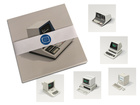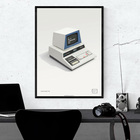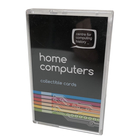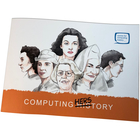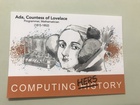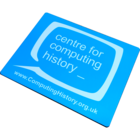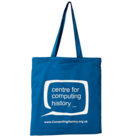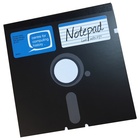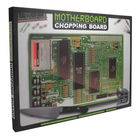About Us
About the Centre for Computing History
Why?
The growth and innovation of the computing revolution has been fast and furious. Having created our global society, whereby our thinking, means of communication and the way we organise our lives have been irreversibly transformed, it is now impossible to envisage a world without computers or the internet.
But there is now a generation of people growing up who know very little about how this has all come to pass. The Centre for Computing History tells this story.
For our Mission statement, please visit our Mission, Vision & Values page.
To find out what we do to help our planet, please see our Environmental Statement.
History
The Centre for Computing History (CCH) began in 2006, when a new ‘hands-on’ museum of personal computing was an idea in the collective mind of three friends, one of whom, Jason Fitzpatrick, owned an extensive collection of computing-related artefacts. The other two founders were Elaine Symonds and Dr Lisa McGerty.
A company was formed in 2007, and together with an engaged and supportive Board, we consulted as widely as we could about our ideas for a museum of computing history in Cambridge, a natural home for such a museum. We formed a charity in 2009, which raised enough funds to be able to afford a building and the museum finally opened to the public in Cambridge in 2013. In 2019, we were awarded Accredited Museum status.
Jason served as Chair of Trustees and then CEO until 2022 when he stepped away, and Lisa then took over the role of CEO, supported by current Chair of Trustees Gareth Marlow.
The CCH is an accredited museum with an active visitor base and firm role in the local and tech communities, achieved with a dedicated staff team and a small army of volunteers, without whom we could not succeed. Jason's collection, passion, knowledge and devotion to computing drove the museum's early success and now Lisa is driving it forward as a highly regarded and unique museum.
Education Services
CCH aims to be an open and welcoming visitor attraction, offering inspirational learning opportunities to a wide range of audiences – from pre-schoolers to the over-70s – so people can confidently and creatively engage with information and digital technologies and their history. We offer a range of learning services on site including programming and electronics workshops, activities exploring the history of computing and other interactive educational opportunities using people's stories along with 1980s BBC Micros, Raspberry Pis and Micro:Bits for school students and the general public.
We also deliver training sessions to teachers so that they have the knowledge, skills and confidence to teach computing and its incredible history to their students in an engaging way.
Collection
The fast-paced nature of the computing industry, along with its tendency to discard irrelevant technology as soon as it becomes outdated, means that the heritage around its origins and subsequent developments is at risk of being lost. CCH aims to preserve this fundamental part of our heritage and ensure it is valued, celebrated and secured for posterity.
CCH has an internationally significant collection of vintage computers, ephemera, artefacts, documents and hands-on displays – in total over 40,000 items. The core collection consists of over a thousand historic computers, as well as mobile phones, games consoles, calculators and, importantly, interviews with the pioneers. CCH holds extensive Cambridge-related archives (e.g. a Sinclair collection and an Acorn collection) as well as hosting the largest collection of Lyons Electronic Office (LEO) artefacts in the world.
Funding and Management
The Centre for Computing History receives no government funding. It is overseen by a broad group of volunteer trustees with day-to-day management delegated to a staff team led by Dr Lisa McGerty, who co-founded the museum in 2006.
To find out more about the People at the heart of the museum, please visit our People page.

